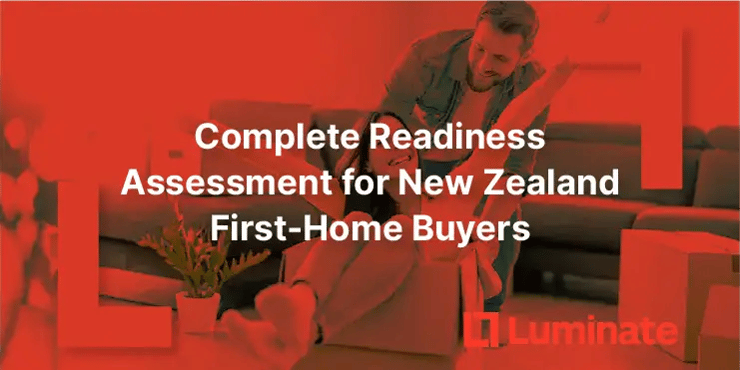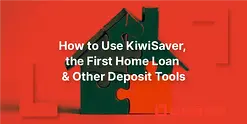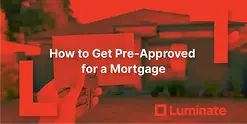Am I Ready to Buy? NZ First-Home Buyer Assessment 2025
 By
Trent Bradley
·
18 minute read
By
Trent Bradley
·
18 minute read

Buying your first home is exciting, but are you ready? Not just financially, but emotionally, practically, and realistically ready for what homeownership entails?
Table of Contents
- Why Readiness Matters More Than Market Timing
- The 5 Dimensions of First-Home Buyer Readiness
- Dimension 1: Financial Readiness Assessment
- Dimension 2: Lifestyle Readiness Assessment
- Dimension 3: Knowledge Readiness Assessment
- Dimension 4: Emotional Readiness Assessment
- Dimension 5: Practical Readiness Assessment
- The Complete Readiness Assessment: Your Overall Score
- Should You Buy Instead of Rent? The Fundamental Question
- Your Personalized Action Plan Based on Readiness
- Common Myths About First-Home Buyer Readiness
- How Luminate Financial Group Assesses and Supports Your Readiness
- Frequently Asked Questions About First-Home Buyer Readiness
- Take the Next Step: Get Your Personal Readiness Assessment
Key Takeaways
- Personal readiness trumps market timing – Being genuinely prepared across financial, lifestyle, knowledge, emotional, and practical dimensions matters more than trying to time the market perfectly.
- Financial readiness requires more than just deposit – You need 10-20% deposit PLUS $15,000-$25,000 buffer for costs, 3-6 months emergency fund, manageable debt under $5,000 on credit cards, and clean credit history with 6+ months stable employment.
- Five dimensions determine true readiness – Financial readiness is weighted at 40%, but you also need adequate lifestyle readiness (25%), knowledge readiness (15%), emotional readiness (10%), and practical readiness (10%) to succeed.
- Location stability is critical – You need to commit to staying in the same city/region for 3-5+ years to break even on purchase and sale costs; shorter ownership periods typically result in financial losses.
- Knowledge gaps cost money – Understanding the complete buying process, total costs, mortgage options, and due diligence requirements prevents expensive mistakes like skipping $800 building inspections only to discover $30,000+ in repairs.
- Readiness scores guide timeline – Scores of 8.5-10 mean you're ready now; 7-8.4 needs 1-3 months; 5.5-6.9 requires 3-6 months; 4-5.4 needs 6-12 months; below 4 requires 12-24+ months of structured preparation.
- Emotional comfort matters as much as numbers – Being psychologically prepared for six-figure debt, sole responsibility for maintenance, and market fluctuations is essential; financial capacity without emotional readiness leads to stress and potential default.
- Renting isn't failure when circumstances don't align – If you value flexibility, plan to relocate, face career uncertainty, or aren't emotionally ready, renting with purpose while preparing is often the smarter financial decision than rushing into homeownership.
There's nothing quite like the excitement of imagining your first home. You picture each room, every future gathering, and the life you'll build in a space that's finally yours. But before you start scrolling through listings or choosing paint colors, it's worth asking an important question: Are you actually ready to buy?
Buying your first home isn't just a milestone—it's a major financial decision that affects your life for years to come. At Luminate Financial Group, we help first-home buyers assess their readiness honestly, so they enter homeownership with confidence rather than stress.
This comprehensive guide will help you determine if you're truly ready to buy, or if you need more time to prepare. We'll cover financial readiness, lifestyle factors, emotional preparation, and practical considerations—so you can make this decision with clarity.
Why Readiness Matters More Than Market Timing
Many first-home buyers focus obsessively on market conditions: "Are prices going up or down?" "Will interest rates fall?" "Is now a good time?"
The truth: Your personal readiness matters far more than market timing.
Buyers who are ready:
- Navigate the process smoothly
- Make confident decisions
- Handle unexpected challenges
- Build long-term wealth
- Experience less stress and regret
Buyers who aren't ready:
- Struggle with every hurdle
- Make fear-based decisions
- Face financial stress
- May default or sell at a loss
- Often regret rushing in
Getting clear on your readiness isn't about perfectionism—it's about setting yourself up for success.
The 5 Dimensions of First-Home Buyer Readiness
True readiness isn't just about having a deposit saved. It encompasses five interconnected dimensions:
| Dimension | What It Covers | Why It Matters |
|---|---|---|
| Financial Readiness | Deposit, income, debt, credit, emergency fund | Can you afford it and get approved? |
| Lifestyle Readiness | Location stability, career stage, family plans | Will buying fit your life circumstances? |
| Knowledge Readiness | Understanding process, costs, responsibilities | Are you informed enough to make good decisions? |
| Emotional Readiness | Comfort with debt, commitment, responsibility | Can you handle the psychological aspects? |
| Practical Readiness | Time, energy, support system | Can you actually execute the purchase? |
You need strength across all five dimensions to be truly ready. Let's assess each one.
Dimension 1: Financial Readiness Assessment
Financial readiness is the most objective and measurable dimension. Let's thoroughly assess where you stand.
The Essential Financial Readiness Checklist
Rate yourself honestly (Yes/No/Partially):
| Financial Factor | Your Status | Target |
|---|---|---|
| Deposit saved | ☐ Yes ☐ No ☐ Partial | 10-20% of target purchase price |
| Income stable | ☐ Yes ☐ No ☐ Partial | 6+ months in current role, reliable income |
| Income sufficient | ☐ Yes ☐ No ☐ Partial | Can service mortgage + all costs |
| Debt manageable | ☐ Yes ☐ No ☐ Partial | Credit cards <$5k, total debt <30% income |
| Credit clean | ☐ Yes ☐ No ☐ Partial | No defaults, no missed payments |
| Banking tidy | ☐ Yes ☐ No ☐ Partial | 3+ months clean statements |
| Emergency fund | ☐ Yes ☐ No ☐ Partial | 3-6 months expenses beyond deposit |
| Budget clear | ☐ Yes ☐ No ☐ Partial | Know all costs and can afford them |
Scoring:
- 7-8 Yes: Financially ready
- 5-6 Yes: Close—address weak areas
- 3-4 Yes: Need 6-12 months preparation
- 0-2 Yes: Need 12-24+ months preparation
Deep Dive: Do You Have Enough Deposit?
Minimum deposit requirements:
- Standard loan: 10% (plus Low Equity Premium under 20%)
- First Home Loan: 5% (if you meet income and price caps)
- Investment property: 30% minimum
But deposit alone isn't enough. You also need:
- Legal fees: $1,500-$3,000
- Building inspection: $500-$1,200
- LIM report: $200-$400
- Moving costs: $500-$2,500
- Emergency buffer: $10,000-$20,000
Total needed for $650,000 property:
- 10% deposit: $65,000
- Additional costs: $15,000-$25,000
- Realistic total: $80,000-$90,000
If you have deposit but no buffer, you're not quite ready.
Income Assessment: Can You Actually Afford It?
It's not about whether the bank will approve you—it's about whether you can comfortably afford it.
Calculate your real affordability:
Example: $650,000 property
- Loan amount (10% deposit): $585,000
- Interest rate: 6.5%
- Monthly mortgage payment: $3,700
- Rates: $250/month
- Insurance: $150/month
- Maintenance: $800/month
- Total monthly housing cost: $4,900
Your affordability check:
- Net monthly income after tax: $______
- Less housing costs: $______
- Less other essentials (food, transport, utilities): $______
- Money remaining: $______
You need at least $500-1,000 remaining for discretionary spending and savings.
If you're left with under $300/month, you're too stretched.
Debt Assessment: What's Holding You Back?
Types of debt and their impact:
| Debt Type | Typical Balance | Monthly Impact | Reduces Borrowing By |
|---|---|---|---|
| Credit card ($10k limit) | Varies | ~$300 | ~$75,000 |
| Personal loan | $8,000 | $350 | ~$85,000 |
| Car loan | $15,000 | $400 | ~$95,000 |
| Student loan | $25,000 | 12% of income | Varies |
| BNPL (multiple accounts) | $2,000 | Red flag | Hard to quantify |
Your debt reduction priority:
- Pay off and close all BNPL accounts (immediate)
- Pay off credit cards and reduce/close accounts
- Clear personal loans if possible
- Consider paying extra on car loan
- Student loan - repays automatically, lower priority
Even small debt reductions can significantly increase borrowing capacity.
Credit History: The Silent Deal-Breaker
Your credit report includes:
- Personal details
- Credit accounts (loans, cards, phone contracts)
- Payment history (on-time vs. late)
- Credit applications (last 5 years)
- Defaults (unpaid debts over $100)
- Public records (judgments, bankruptcy)
Common credit issues that stop first-home buyers:
- Unpaid defaults (even small ones)
- Recent multiple credit applications
- Late payment patterns
- Accounts in collection
- Recent bankruptcy or insolvency
How to check and improve:
- Get free credit report from Centrix, Equifax, and illion
- Dispute any errors immediately
- Pay off legitimate defaults and request removal
- Make all payments on time for 6+ months
- Avoid new credit applications
- Close unused accounts
Timeline: 6-12 months to significantly improve credit score
Emergency Fund: The Often-Forgotten Essential
Why you need emergency fund beyond deposit:
- Job loss or income reduction
- Unexpected major repairs (roof, plumbing, foundation)
- Medical emergencies
- Car breakdown
- Appliance failures
Minimum emergency fund: 3 months expenses
- Mortgage payment: $3,700
- All ownership costs: $1,200
- Living expenses: $2,000
- Monthly total: $6,900
- 3 months = $20,700
If you're using every dollar for deposit and have no buffer, you're setting up for potential crisis.
Financial Readiness Action Plan
If you scored 7-8/8: You're ready! Focus on maintaining position and starting pre-approval process.
If you scored 5-6/8: Close but not quite. Identify your 1-2 weak areas and create 3-6 month plan to address them.
If you scored 3-4/8: Need substantial work. Create 6-12 month plan focusing on:
- Building deposit through aggressive saving
- Paying down high-interest debt
- Cleaning up credit and banking
- Increasing or stabilizing income
If you scored 0-2/8: Need fundamental financial restructuring. Create 12-24 month plan:
- Financial literacy education
- Debt elimination
- Savings habit development
- Income growth strategies
- Credit repair
At Luminate, we provide month-by-month plans with specific milestones for each readiness level.
Dimension 2: Lifestyle Readiness Assessment
Financial readiness alone isn't enough. Your life circumstances must align with homeownership commitments.
Location Stability: Are You Staying Put?
Critical question: Will you stay in the same city/region for 3-5+ years?
Why this matters:
- Need 3-5 years to break even on purchase/sale costs
- Short ownership periods usually lose money
- Moving frequently with property creates complications
- Renting while owning elsewhere adds complexity
You're locationally ready if:
- Career is based in this city long-term
- Family connections keep you in area
- Partner/spouse also committed to location
- No plans for overseas work or extended travel
- Children's school situation settled
Red flags suggesting you're not ready:
- Considering job opportunities in other cities
- Relationship might lead to relocation
- Thinking about overseas experience
- Career path likely requires moving
- Unsure where you want to settle long-term
If you might move in 2-3 years, renting is likely smarter.
Career Stage: Is Your Income Stable?
Ideal career stage for first-home buying:
- Established in profession/trade (not entry-level)
- 6+ months in current role (preferably 12+)
- Permanent employment (not casual/contract)
- Clear career trajectory
- Income unlikely to drop significantly
- Job security reasonable
Warning signs you might not be ready:
- Just started new job (under 3 months)
- Considering career change
- In probation period
- Casual or contract work without long history
- Industry facing significant uncertainty
- Planning to reduce hours or income soon
Special considerations:
- Self-employed: Need 2+ years trading history
- Commission-based: Need 12-24 months proven income
- Contract work: Need consistent ongoing contracts
- Career break planned: May want to wait until after
Relationship and Family Planning
Your relationship status affects readiness:
Single buyers:
- Can afford property alone
- Comfortable with sole responsibility
- Not expecting relationship to change housing needs soon
- Property suitable if circumstances change
Couples buying together:
- Relationship stable and committed
- Both on same page about purchase
- Finances transparently discussed
- Legal implications understood (both on title, both on mortgage)
Couples where only one is buying:
- Understand legal and financial implications
- Discussed what happens if circumstances change
- Comfortable with arrangement
Family planning considerations:
- Children planned in next 2-3 years?
- Will income reduce (parental leave)?
- Will space needs change significantly?
- Is this property suitable for family?
If major relationship or family changes are imminent, timing might not be right.
Flexibility vs. Stability Trade-Off
Homeownership reduces flexibility:
- Can't easily relocate for opportunities
- Locked into location for several years
- Selling property takes 3-6+ months
- Rental income if you leave is extra complexity
Homeownership increases stability:
- Can't be forced to move by landlord
- Housing costs more predictable long-term
- Build community connections
- Create permanent base
You're lifestyle-ready if:
- You value stability over flexibility right now
- You're at life stage where settling makes sense
- Career doesn't require geographic mobility
- You're comfortable with commitment
If you still crave maximum flexibility and adventure, renting might suit you better for now.
Dimension 3: Knowledge Readiness Assessment
Do you understand what you're getting into? Knowledge gaps lead to poor decisions and regret.
Essential Knowledge Checklist
Rate your understanding (Good/Fair/Poor):
| Knowledge Area | Your Understanding | Why It Matters |
|---|---|---|
| Buying process steps | ☐ Good ☐ Fair ☐ Poor | Avoid surprises and delays |
| Total costs involved | ☐ Good ☐ Fair ☐ Poor | Budget accurately |
| Mortgage products | ☐ Good ☐ Fair ☐ Poor | Choose right structure |
| Property due diligence | ☐ Good ☐ Fair ☐ Poor | Avoid buying problem property |
| Legal requirements | ☐ Good ☐ Fair ☐ Poor | Protect your interests |
| Ownership responsibilities | ☐ Good ☐ Fair ☐ Poor | Realistic expectations |
| Market conditions | ☐ Good ☐ Fair ☐ Poor | Make informed decisions |
If you have 3+ "Poor" ratings, you need education before buying.
Common Knowledge Gaps That Cost Buyers
Gap 1: Not understanding total costs
- Focus only on deposit
- Forget legal, inspection, moving costs
- Underestimate ongoing ownership costs
- Run out of money at settlement
Gap 2: Not knowing loan structure options
- Accept first loan offered
- Don't understand fixed vs. floating
- Miss offset account benefits
- Cost themselves tens of thousands over time
Gap 3: Not doing proper due diligence
- Skip building inspection to save $800
- Don't read LIM report properly
- Miss major defects
- Buy property with $30,000+ problems
Gap 4: Not understanding market cycles
- Buy at peak without knowing
- Expect unrealistic appreciation
- Panic-sell during downturn
- Make emotional rather than informed decisions
How to close knowledge gaps:
- Read comprehensive guides (like this series!)
- Attend first-home buyer seminars
- Consult with mortgage adviser early
- Talk to recent first-home buyers
- Research specific areas and property types
- Understand local market conditions
At Luminate, we provide education throughout the process—you'll never make decisions you don't understand.
Dimension 4: Emotional Readiness Assessment
Homeownership comes with psychological challenges. Are you emotionally prepared?
Comfort With Debt and Financial Commitment
Mortgages are big, long-term debt:
- $500,000-$700,000 is typical for first-home buyers
- 25-30 year commitment
- Feels overwhelming to many people
- Requires psychological comfort with owing money
You're emotionally ready for mortgage debt if:
- You understand debt is tool for wealth-building
- You're comfortable with long-term financial commitment
- You can distinguish between "good debt" (appreciating asset) and "bad debt" (depreciating purchases)
- You won't lose sleep over six-figure debt
- You trust your ability to make ongoing payments
You might not be emotionally ready if:
- Any debt causes significant anxiety
- You feel stressed about owing money
- You prefer to own things outright always
- The size of mortgage feels crushing
- You'd constantly worry about it
There's no shame in this—some people genuinely aren't wired for debt comfort. Renting or continuing to save for much larger deposit might be better for your mental health.
Accepting Responsibility and Maintenance
As a homeowner, everything is your responsibility:
- Roof leaks? Your problem and your cost
- Hot water cylinder breaks? Your problem
- Fence collapses in storm? Your problem
- Plumbing issues at 2am? Your problem
You're ready for homeownership responsibility if:
- You're comfortable being self-reliant
- You can handle unexpected expenses
- You're reasonably handy or willing to pay trades
- You won't panic when things break
- You understand maintenance is ongoing
You might not be ready if:
- You prefer having landlord handle everything
- Unexpected costs cause major stress
- You have no emergency fund or skills
- You'd rather someone else deal with problems
- Idea of constant maintenance feels overwhelming
Dealing With Market Uncertainty
Property values fluctuate:
- Your home might drop in value short-term
- Interest rates will change over time
- Market conditions will shift
- Economic uncertainty affects housing
You're emotionally ready if:
- You're buying for long-term (5-10+ years)
- Short-term value changes don't stress you
- You understand property is long-term investment
- You won't panic-sell if market drops
- You can wait out market cycles
You might struggle if:
- You'd obsess over property valuations
- Market drops would cause panic
- You might need to sell in 2-3 years
- You expect constant appreciation
- Uncertainty causes major anxiety
Handling Life Stage Transition
Homeownership is a major life milestone:
- Signals "adulthood" in societal eyes
- Represents settling down
- Often coincides with other major changes (marriage, children, career advancement)
You're ready for this transition if:
- You're comfortable with "adulting"
- You're ready to settle somewhat
- You're not still craving complete freedom
- This aligns with your life vision
- You feel emotionally mature enough
You might not be ready if:
- You feel you're rushing into adulthood
- You're not ready to settle anywhere
- You feel pressured by external expectations
- This doesn't align with your values
- You'd feel trapped or regretful
Buying should feel exciting and natural, not forced or premature.
Dimension 5: Practical Readiness Assessment
Do you have the time, energy, and support to actually execute a property purchase?
Time and Energy Commitments
The home buying process requires significant time:
Pre-approval phase (1-2 weeks):
- Gathering documents: 2-5 hours
- Meeting with mortgage adviser: 2-3 hours
- Responding to bank queries: 1-2 hours
Property search phase (2-12 weeks):
- Researching areas and listings: 5-10 hours/week
- Attending open homes: 3-6 hours/week
- Property analysis and comparison: 2-4 hours/week
Offer and due diligence phase (2-3 weeks):
- Property visits and inspections: 4-8 hours
- Review reports and documentation: 3-5 hours
- Negotiations and decision-making: 2-4 hours
- Lawyer and adviser meetings: 2-3 hours
Settlement phase (4-6 weeks):
- Final documentation: 2-3 hours
- Moving preparation and execution: 10-20 hours
- Setup and organization: 10-15 hours
Total time investment: 50-100+ hours over 2-4 months
You're practically ready if:
- You can commit weekends to open homes
- You have mental space for major decisions
- You can respond promptly to time-sensitive matters
- You're not overwhelmed by current commitments
You might not be ready if:
- Work is extremely demanding right now
- Major life events happening simultaneously (wedding, new baby, health issues, family crisis)
- You're too exhausted to take on something major
- Other commitments would prevent timely responses
Sometimes the right decision is "not right now"—even if financially ready.
Support System
Buying a home is easier with support:
- Partner or family members providing encouragement
- Friends who've been through process to ask questions
- Professional team (mortgage adviser, lawyer, building inspector)
- Financial safety net if needed
Strong support system includes:
- People who understand and support your goals
- Professional advisers you trust
- Emergency contacts if things go wrong
- Emotional support during stressful moments
Weak or absent support might mean:
- Doing everything completely alone
- No one to discuss decisions with
- No financial backup if crisis occurs
- Added stress and pressure
While you can buy without extensive support, having it makes the journey significantly easier.
The Complete Readiness Assessment: Your Overall Score
Now let's bring together all five dimensions for your overall readiness picture.
Calculate Your Composite Readiness Score
| Dimension | Your Score /10 | Weight | Weighted Score |
|---|---|---|---|
| Financial Readiness | ___/10 | ×0.40 | ___ |
| Lifestyle Readiness | ___/10 | ×0.25 | ___ |
| Knowledge Readiness | ___/10 | ×0.15 | ___ |
| Emotional Readiness | ___/10 | ×0.10 | ___ |
| Practical Readiness | ___/10 | ×0.10 | ___ |
| TOTAL | ___/10 |
Interpreting your total score:
8.5-10.0: Highly Ready
- You're ready to buy now
- Start pre-approval process immediately
- Begin active property search
- Expect smooth journey with few obstacles
7.0-8.4: Mostly Ready
- Very close to being ready
- Address 1-2 specific weak areas
- Timeline: 1-3 months to full readiness
- Can start pre-qualification now
5.5-6.9: Moderately Ready
- Several areas need strengthening
- Create 3-6 month preparation plan
- Focus on biggest gaps first
- Stay in touch with adviser during preparation
4.0-5.4: Somewhat Ready
- Substantial work needed across multiple areas
- Timeline: 6-12 months realistic
- Need structured improvement plan
- Consider this preparation period an investment
Below 4.0: Not Yet Ready
- Need fundamental preparation
- Timeline: 12-24+ months
- Focus on financial basics first
- Use this time to build strong foundation
Remember: Lower scores aren't failures—they're clarity about what you need to work on.
Should You Buy Instead of Rent? The Fundamental Question
Even if you're ready to buy, should you? Let's address this head-on.
When Buying Makes More Sense Than Renting
Buy if:
- You're financially and practically ready (score 7+)
- You'll stay in area 3-5+ years
- You want to build long-term wealth
- You value stability and control
- You understand and accept responsibilities
- Rent vs. mortgage costs are comparable
Financial math typically favors buying when:
- You stay 5+ years (breaks even on costs)
- Property appreciates at least 3-4% annually
- You're disciplined about maintenance
- You leverage equity for future investments
When Renting Might Still Be Smarter
Rent if:
- Readiness score under 6.0
- Location plans uncertain
- Career might require mobility
- Major life changes imminent
- You genuinely value flexibility over wealth-building
- You'd be dangerously financially stretched
Renting is not "throwing money away"—it's paying for flexibility and reducing responsibility.
The key is renting with purpose:
- Set clear savings goals
- Work toward homeownership timeline
- Build deposit systematically
- Review readiness quarterly
Your Personalized Action Plan Based on Readiness
Based on your composite readiness score, here's what to do next.
For Highly Ready (8.5-10.0): Take Action Now
Immediate next steps (this week):
- Book consultation with mortgage adviser
- Start gathering financial documents
- Research target areas intensively
- Set up property alerts
- Review budget one final time
Next 2-4 weeks:
- Complete pre-approval application
- Attend open homes every weekend
- Build shortlist of suitable properties
- Engage property lawyer
- Set up building inspector contacts
Next 1-3 months:
- Make offers on suitable properties
- Complete due diligence thoroughly
- Negotiate and finalize purchase
- Prepare for settlement
- Celebrate new homeownership!
Estimated timeline to keys: 2-4 months
For Mostly Ready (7.0-8.4): Quick Preparation
Identify your 1-2 weak areas:
- Slightly low deposit? Save aggressively for 6-12 weeks
- Recent job change? Wait until 3 months in role
- Small debt issue? Pay off quickly
- Credit concern? Address and wait for improvement
Your 1-3 month plan:
- Month 1: Address primary gap aggressively
- Month 2: Confirm improvement, start pre-qualification
- Month 3: Full pre-approval and begin serious search
Stay engaged with adviser during this period for guidance.
Estimated timeline to keys: 4-6 months
For Moderately Ready (5.5-6.9): Structured Preparation
Create comprehensive 3-6 month plan:
Months 1-2: Financial Foundation
- Aggressive debt reduction
- Build additional savings
- Clean up banking conduct
- Improve credit if needed
Months 3-4: Knowledge and Preparation
- Educate yourself thoroughly
- Pre-qualify with adviser
- Research areas and property types
- Build support system
Months 5-6: Transition to Action
- Formal pre-approval
- Active property research
- Attend open homes
- Prepare to make offers
Estimated timeline to keys: 6-9 months
For Somewhat Ready (4.0-5.4): Foundation Building
Your 6-12 month strategic plan:
Months 1-3: Financial Basics
- Create and stick to budget
- Automate savings
- Pay down high-interest debt
- Stop credit card usage
Months 4-6: Income and Stability
- Ensure employment stable (6+ months)
- Address any credit issues
- Build emergency fund
- Clean banking history
Months 7-9: Deposit Building
- Maximize savings rate
- Consider income increases
- Build toward deposit target
- Maintain financial discipline
Months 10-12: Pre-Qualification
- Meet with mortgage adviser
- Get realistic assessment
- Understand exact position
- Plan final push if needed
Estimated timeline to keys: 12-18 months
For Not Yet Ready (Below 4.0): Long-Term Planning
Your 12-24+ month foundational plan:
Phase 1 (Months 1-6): Financial Literacy
- Learn budgeting basics
- Understand how credit works
- Study home buying process
- Set long-term goals
Phase 2 (Months 7-12): Debt Elimination
- Aggressively pay down debt
- Close problematic accounts
- Build clean financial history
- Start emergency fund
Phase 3 (Months 13-18): Deposit Building
- Consistent savings habit
- Increase income if possible
- Maximize KiwiSaver
- Reduce living costs strategically
Phase 4 (Months 19-24): Readiness Check
- Reassess all dimensions
- Pre-qualify with adviser
- Adjust timeline if needed
- Prepare for final push
Estimated timeline to keys: 24-36 months
This isn't failure—it's a realistic, achievable path forward.
Common Myths About First-Home Buyer Readiness
Let's bust some myths that might be holding you back or pushing you forward prematurely.
Myth 1: "You need to be perfect to buy your first home"
Reality: Nobody is perfectly ready. You need to be adequately ready across key dimensions, not perfect in all areas. Waiting for perfection means never buying.
Myth 2: "If the bank approves you, you're ready"
Reality: Banks assess whether they'll get paid back, not whether homeownership suits your life or you can comfortably afford it. Bank approval is necessary but not sufficient.
Myth 3: "You must have 20% deposit before buying"
Reality: You can buy with 10% (paying Low Equity Premium) or 5% with First Home Loan. Waiting years for 20% often costs more than the premium.
Myth 4: "Everyone should buy as soon as possible"
Reality: Homeownership suits certain life stages and circumstances better than others. Renting is sometimes genuinely the smarter choice.
Myth 5: "Your first home should be your dream home"
Reality: First homes are stepping stones. They're about getting started, building equity, and creating options. Dream homes come later.
Myth 6: "If you're not ready by 30, you've failed"
Reality: Everyone's timeline is different based on education, career path, life circumstances, and goals. There's no "right" age—only right readiness.
How Luminate Financial Group Assesses and Supports Your Readiness
At Luminate, readiness assessment is core to what we do. We don't just ask "can we get you approved?"—we ask "are you genuinely ready for homeownership?"
Our Comprehensive Readiness Review
What we assess:
- Complete financial position (not just income)
- Life stage and stability factors
- Knowledge gaps and education needs
- Emotional comfort with commitment
- Practical ability to execute
What we provide:
- Honest assessment of readiness level
- Specific gaps identified with clarity
- Personalized timeline and action plan
- Month-by-month milestones if preparation needed
- Ongoing support through preparation phase
We've told many clients "you're not quite ready yet" and helped them prepare properly—resulting in successful, stress-free purchases months later.
Real Stories: Readiness Journeys
Story 1: Sarah - Thought She Wasn't Ready
- Came to us thinking she needed 2 more years
- We assessed she was actually 95% ready
- Just needed to close one credit card
- Bought her first home 3 months later
Story 2: James & Emma - Thought They Were Ready
- Eager to buy immediately
- We identified they were too stretched financially
- Created 6-month debt reduction plan
- Bought in much stronger position with no stress
Story 3: Mike - Long-Term Preparation
- Started with readiness score of 3/10
- We created 18-month structured plan
- Hit every milestone methodically
- Bought confidently when genuinely ready
The common thread: Honest assessment leads to right timing and successful outcomes.
Frequently Asked Questions About First-Home Buyer Readiness
How do I know if I'm financially ready to buy?
You're financially ready when you have: (1) 10-20% deposit plus buffer for costs, (2) stable income that can service mortgage comfortably, (3) manageable debt (ideally under $5,000 in credit cards), (4) clean credit history, and (5) emergency fund of 3-6 months expenses beyond deposit.
Can I buy if I've only been in my job for 3 months?
Most banks want 6+ months employment history, preferably 12+ months. However, if you're in the same industry/profession and can show long-term career stability, some lenders may approve with less time in current role. Speak with mortgage adviser about specific situation.
Do I need to know everything about property before buying?
No, but you need to understand the basics: the buying process, total costs involved, your responsibilities as an owner, and how to do proper due diligence. You'll learn more through the journey—perfect knowledge isn't required, but dangerous ignorance should be avoided.
What if I'm emotionally unsure about taking on a mortgage?
This is normal! Mortgages are big commitments. Talk through your concerns with adviser, understand the numbers thoroughly, and ensure you're not borrowing at your maximum. If anxiety persists despite understanding, waiting or buying less expensive property might be better for your wellbeing.
Should I wait until my partner and I are married to buy?
Not necessarily. Many unmarried couples buy together successfully. However, you should: (1) be in committed, stable relationship, (2) have discussed finances openly, (3) understand legal implications, and (4) have lawyer explain ownership options (tenants in common vs. joint tenants).
How long does it take to go from "not ready" to "ready"?
It depends on your starting point and dedication. Minor gaps can be fixed in 3-6 months. Moderate gaps typically take 6-12 months. Substantial preparation might need 12-24 months. The key is focused, consistent action on specific goals.
What's the single most important readiness factor?
Financial readiness is weighted highest (40%) because without it, nothing else matters. However, you need adequate readiness across all dimensions—strong finances alone aren't enough if life circumstances don't align.
Can I buy if I'm planning to have children soon?
Yes, but consider: (1) Will reduced income affect mortgage affordability? (2) Is property suitable for family? (3) Is location good for schools/childcare? (4) Can you handle mortgage during parental leave? If answers are yes, buying before children can provide stability. If no, wait until after or buy less expensive property.
What if I'm ready but my friends say it's a bad time to buy?
Your friends don't know your full financial situation, goals, or circumstances. If you're genuinely ready across all dimensions, their opinions about market timing matter less. Personal readiness beats market timing. Get professional assessment rather than relying on friend opinions.
Is it better to rent forever if I value flexibility?
Not necessarily "forever," but if you genuinely value flexibility over wealth-building and you're in life stage where mobility is important, renting can be smart choice temporarily. However, most people eventually value stability and building equity. Revisit the question every year or two.
Take the Next Step: Get Your Personal Readiness Assessment
You've completed this comprehensive guide—now it's time to get expert, personalized feedback on your specific situation.
Book Your Free First-Home Readiness Assessment
In this complimentary session, we'll:
- Assess your readiness across all five dimensions
- Calculate your composite readiness score
- Identify specific gaps or weak areas
- Create personalized action plan with timeline
- Provide honest recommendation: buy now or prepare first
- Answer all your questions without pressure
This assessment is perfect if you're:
- Wondering if you're actually ready to buy
- Unsure what you need to work on first
- Want expert opinion on your timeline
- Need clarity on your specific situation
- Want structured plan forward
What you'll leave with:
- Clear readiness score and assessment
- If ready now: Pre-approval pathway
- If not quite ready: Month-by-month preparation plan
- Confidence in your path forward
- Expert support for your journey
Why Choose Luminate for Your Readiness Assessment
We're honest, not pushy:
- We've told many clients they're not ready yet
- We help you prepare properly rather than rushing
- Your long-term success matters more than quick sale
We're thorough:
- Assess all dimensions, not just finances
- Consider your complete situation
- Identify gaps you might have missed
We're supportive:
- Ongoing guidance through preparation phase
- Celebrate when you hit milestones
- Here for the entire journey
We're expert:
- Helped hundreds through readiness to ownership
- Know exactly what lenders look for
- Understand NZ market and requirements
Ready to Find Out Where You Stand?
Don't leave this crucial decision to guesswork. Get expert assessment of your readiness and clear direction forward.
Contact Luminate Financial Group:
📞 Call 0800 333 400📧 Email askus@luminate.co.nz
🌐 Visit luminate.co.nz
Your first home is an exciting milestone—let's make sure you're ready to enjoy it without stress, regret, or financial strain.
Disclaimer: This article provides general information and should not be considered personal financial advice. Readiness for homeownership depends on individual circumstances including financial position, life stage, emotional preparedness, and personal goals. Lending criteria and requirements vary by lender and change over time. Always seek personalized advice from qualified professionals about your specific situation.

Trent Bradley
Trent Bradley is a New Zealand financial advisor specializing in property-backed finance and investment consulting. With over 26 years of experience running his mortgage broking business, he has helped wholesale investors access high-yield property-backed loan opportunities. For the past 12 years, Trent has led Luminate Finance, a New Zealand finance company dedicated to connecting investors with secure property investment solutions.


























